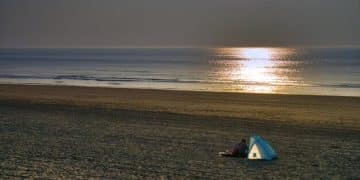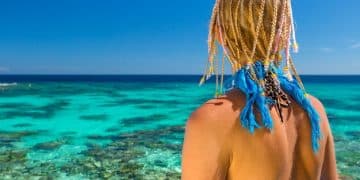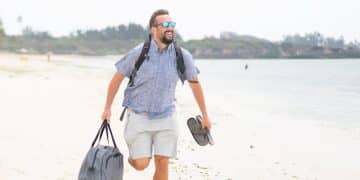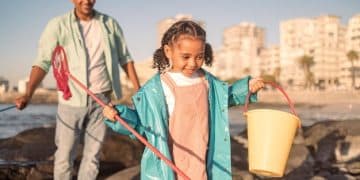Beach First Aid Kit: Pack These Essentials for a Safe Trip
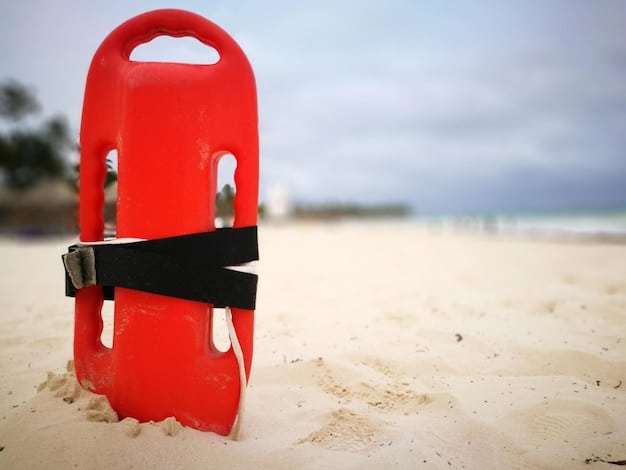
A beach first aid kit is crucial for addressing common injuries like cuts, sunburns, and dehydration, ensuring a safe and enjoyable beach experience by enabling prompt and effective care for unexpected emergencies.
Planning a beach trip? Don’t let unexpected injuries spoil your fun. Packing a comprehensive beach first aid kit: essential items to pack for unexpected emergencies is crucial for addressing minor cuts, sunburns, dehydration, and more, ensuring a safe and enjoyable day by the sea.
Essential Items for Your Beach First Aid Kit
Preparing for a beach trip involves more than just packing sunscreen and towels. A well-stocked first aid kit can be your first line of defense against common beach-related injuries, allowing you to address minor issues quickly and get back to enjoying your day.
Basic Wound Care Supplies
Cuts and scrapes are common occurrences at the beach, whether from sharp shells, rocks, or even minor accidents during beach games. Having the right supplies to clean and protect these wounds is essential.
- Adhesive Bandages: A variety of sizes to cover different types of small cuts and abrasions.
- Antiseptic Wipes: To clean the wound and prevent infection before applying a bandage.
- Gauze Pads: For larger scrapes or cuts that require more coverage.
- Medical Tape: To secure gauze pads in place.
Proper wound care can minimize the risk of infection and promote faster healing, ensuring that a minor injury doesn’t turn into a major problem.
Sun Protection and Burn Relief
The sun’s rays can be intense at the beach, and even with sunscreen, sunburns can happen. Including items for sun protection and burn relief in your first aid kit is crucial for comfort and long-term skin health.
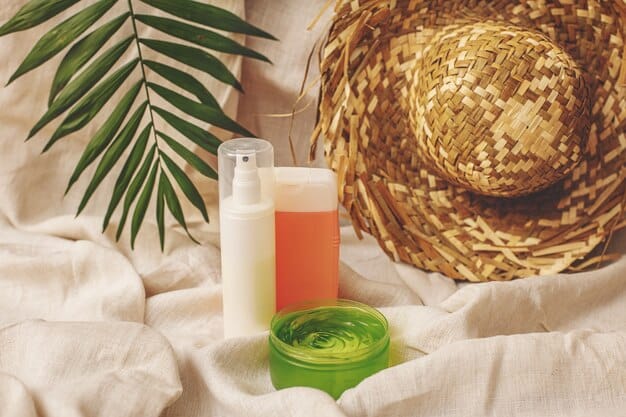
Sunscreen Essentials
Prevention is always better than cure. Having high-quality sunscreen readily available is the first step in protecting yourself from the sun’s harmful rays.
- Broad-Spectrum Sunscreen: SPF 30 or higher to protect against both UVA and UVB rays.
- Lip Balm with SPF: To protect your lips from sunburn and dryness.
- Application Frequency: Remember to reapply every two hours, or more often if swimming or sweating.
Consistent sunscreen use is vital for preventing sunburn and reducing the risk of long-term skin damage.
Treating Sunburns
Despite your best efforts, sunburns can still occur. Having the right products on hand can provide relief and promote healing.
- Aloe Vera Gel: To soothe and moisturize the skin, reducing inflammation and pain.
- Cool Compress: A clean cloth soaked in cool water to provide immediate relief.
Prompt treatment of sunburns can minimize discomfort and prevent further skin damage.
Hydration and Electrolyte Replacement
Dehydration is a common concern at the beach, especially during hot weather and physical activity. Including items for hydration and electrolyte replacement in your first aid kit can help prevent and treat dehydration.
Hydration Options
Staying hydrated is essential for maintaining energy levels and overall health at the beach.
- Water Bottles: Bring plenty of water to stay hydrated throughout the day.
- Electrolyte Supplements: To replace lost electrolytes through sweat, especially during strenuous activities.
Sufficient hydration can prevent heat exhaustion and improve your overall beach experience.
Dealing with Insect Bites and Stings
Insects and marine creatures can sometimes cause bites and stings that can be painful and irritating. Including items to treat these incidents in your first aid kit is a good idea.
Treating Insect Bites
Mosquitoes, sand flies, and other insects can be common at the beach. Having the right products to relieve the itching and inflammation from insect bites can make your day more comfortable.
- Insect Repellent: To prevent bites in the first place.
- Antihistamine Cream: To relieve itching and reduce inflammation.
- Calamine Lotion: To soothe irritated skin.
Prompt treatment of insect bites can prevent excessive scratching and reduce the risk of secondary infections.
Handling Marine Stings
Jellyfish and other marine creatures can sometimes sting swimmers and beachgoers. Knowing how to respond and having the right supplies can minimize the pain and potential complications.
- Vinegar: To neutralize jellyfish stings.
- Tweezers: To remove any remaining tentacles.
- Pain Relievers: To manage pain and discomfort.
Proper first aid for marine stings can alleviate pain and prevent allergic reactions.
Addressing Minor Injuries and Ailments
A comprehensive first aid kit should also include items to address other common minor injuries and ailments that can occur at the beach.
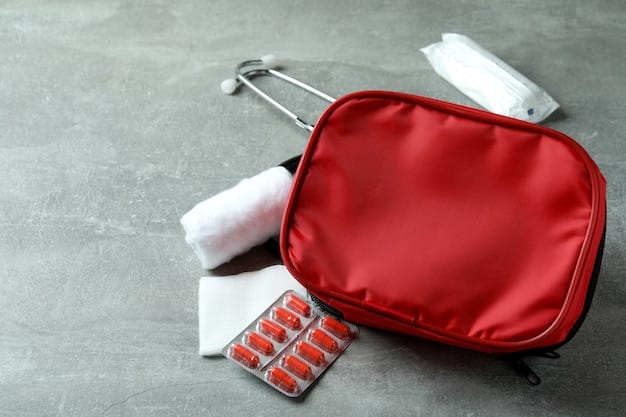
Pain Relief
Headaches, muscle soreness, and minor aches can all occur at the beach. Having pain relievers in your first aid kit can provide relief and allow you to continue enjoying your day.
- Ibuprofen or Acetaminophen: For pain relief.
Motion Sickness and Allergies
If you’re prone to motion sickness or allergies, including appropriate medications in your first aid kit can help prevent and manage these issues.
- Motion Sickness Medication: If you’re planning a boat trip or are sensitive to motion.
- Antihistamines: For allergy relief.
Addressing these minor issues promptly can improve your overall beach experience.
Assembling and Maintaining Your Beach First Aid Kit
Knowing what to include in your beach first aid kit is only half the battle. It’s also important to assemble your kit properly and maintain it so that it’s ready when you need it.
Choosing the Right Container
The container you choose for your first aid kit should be durable, waterproof, and easy to carry.
- Waterproof Bag or Box: To protect the contents from water damage.
- Compact Size: To make it easy to transport.
Regular Maintenance
To ensure that your first aid kit is always ready for use, it’s important to check it regularly and replace any expired or used items.
- Check Expiration Dates: Replace expired medications and supplies.
- Restock Used Items: Replenish any items that have been used.
Regular maintenance can ensure that your first aid kit is always in top condition.
| Key Item | Brief Description |
|---|---|
| 🩹 Wound Care | Bandages, antiseptic wipes for cuts. |
| ☀️ Sun Protection | Sunscreen, lip balm with SPF to prevent sunburn. |
| 💧 Hydration | Water, electrolyte supplements to combat dehydration. |
| 🦟 Insect Relief | Repellent, antihistamine cream for bites. |
Frequently Asked Questions
▼
Sunscreen is arguably the most critical item, as it protects against harmful UV rays and prevents sunburn, which can ruin a beach day quickly. Regular application is key.
▼
Sunscreen should be reapplied every two hours, or immediately after swimming or excessive sweating, to ensure continuous protection from the sun.
▼
Rinse the area with vinegar to neutralize the venom. Afterward, carefully remove any remaining tentacles with tweezers and apply a cold compress for pain relief.
▼
Drink plenty of water throughout the day, especially if you are active. Electrolyte supplements can also help replace minerals lost through sweat, aiding in hydration.
▼
Store your kit in a cool, dry place, away from direct sunlight. A waterproof bag or container is ideal to protect the contents from moisture and sand while at the beach.
Conclusion
Packing a beach first aid kit: essential items to pack for unexpected emergencies is a simple yet crucial step in ensuring a safe and enjoyable beach experience. From addressing minor cuts and sunburns to preventing dehydration and managing insect bites, being prepared for unexpected emergencies can provide peace of mind and allow you to focus on making lasting memories by the sea.
